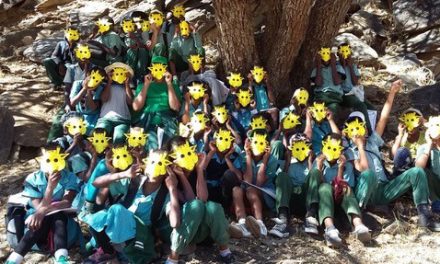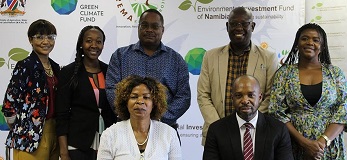
Barbut calls for indicators of adaptation

Minister of Environment and Tourism and President of the eleventh Conference of Parties (COP11) Hon. Uahekua Herunga congratulates the newley appointed United Nations Convention to Combat Desertification (UNCCD) Executive Secretary, Monique Barbut. (Photograph by Hilmah Hashange)
Speaking to the media for the first time since her appointment, Barbut, whose three year term as the new Executive Secretary to the UNCCD commences on 1 October 2013, says she is happy to be given such an important role as this convention is closest to her heart. She added that during her tenure, her work will be a continuation of her predecessor’s but will also include her own ideals.
According to Barbut, the UNCCD is probably the only convention that does not receive enough attention and support as opposed to the other conventions of the Rio + 20.”This convention is a global one, it is not only for affected countries,” said Barbut.
She noted that the UNCCD deals with many issues such as food security, human migration, peace and security therefore it is important to outline aspects of the convention in future. She said too much focus is given on science and not on the best programmes that help alleviate land degradation and offer income to poor communities. “The 5% of science already available is enough, let us not wait for 100%, let us come to concrete outcomes,” she said.
In regard to financing of programmes in Africa, Barbut says the coin of finance has two sides, with Africa saying it does not receive enough financial support while the rest of the world is of the opinion that Africa gets all the financing. Barbut said that both statements are incorrect adding that there is simply just not enough money to finance every programme.
She noted however that financing of programmes has decreased in the last 2 years. “The Global Environmental Facility (GEF) has financed US$ 675 billion towards land degradation in the past two years and yes it is true that Africa got the largest portion of the money but that is because African countries fight together and unite towards land degradation and deforestation issues,” she said. Barbut made reference to the Great Green wall initiative, an African partnership which aims to tackle poverty, desertification and land degradation by planting a 4 000 mile wall of trees.
Barbut said one of her focus areas during her tenure will be to fight towards establishing 5 000 eco-villages in India through the country’s Sustainable Land and Ecosystem Management Country Partnership (SLEM) Program.












































